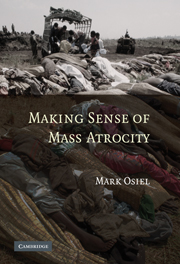Book contents
- Frontmatter
- Contents
- Dedication
- Preface
- Introduction
- 1 The Challenge of Prosecuting Mass Atrocity
- PART I LEGAL RULES AND THEIR PROBLEMS
- PART II THE POLITICAL CONTEXT OF LEGAL CHOICE
- PART III NEW POSSIBILITIES AND SOLUTIONS
- 9 Collective Sanctions for Collective Wrong
- 10 The Collective Responsibility of Military Officers
- 11 Being Economical with Amnesty
- Conclusion
- Index
- References
11 - Being Economical with Amnesty
Published online by Cambridge University Press: 15 September 2009
- Frontmatter
- Contents
- Dedication
- Preface
- Introduction
- 1 The Challenge of Prosecuting Mass Atrocity
- PART I LEGAL RULES AND THEIR PROBLEMS
- PART II THE POLITICAL CONTEXT OF LEGAL CHOICE
- PART III NEW POSSIBILITIES AND SOLUTIONS
- 9 Collective Sanctions for Collective Wrong
- 10 The Collective Responsibility of Military Officers
- 11 Being Economical with Amnesty
- Conclusion
- Index
- References
Summary
Amnesties from criminal prosecution for departing dictators and war criminals pose vexing moral dilemmas for transitional societies. These questions normally define the central terms of discussion and debate. Rightly so. But let us briefly consider, as an excursus to this book's central argument, whether the decision to grant such amnesties also might be susceptible to economic analysis.
Trading justice for peace would first appear a congenial object of such analysis, for it resembles the process of plea bargaining that legal economists have long examined. An amnesty from prosecution resembles such bargains in that the departing dictator gives up something of value (i.e., political power, sometimes also the “truth” about his or her crimes) in exchange for freedom from criminal trial. Amnesties are executory contracts. The political faction granting the amnesty (i.e., the new constitutionally empowered leadership) derives the benefit of the bargain immediately – in the fact of the dictator's departure – whereas the value to the dictator himself and his henchmen accrues over time. But given this disparity in the parties' time horizons, the question arises whether any stable state of equilibrium is possible.
Let us begin by considering a modest thought experiment, perhaps proposed by an economist who was politically tone deaf, immune to shifting breezes of moral opinion. This economist might go so far as to propose that some country should offer itself as a permanent place of refuge for departing dictators and their henchmen.
- Type
- Chapter
- Information
- Making Sense of Mass Atrocity , pp. 218 - 240Publisher: Cambridge University PressPrint publication year: 2009



